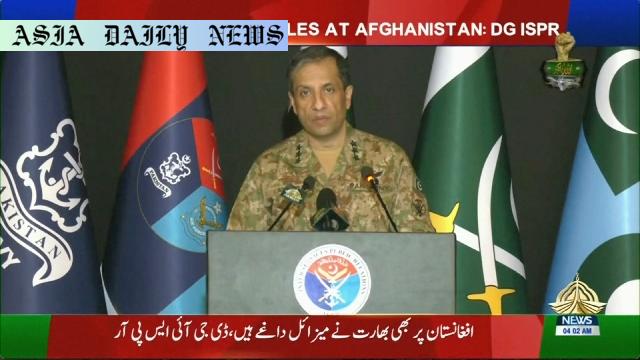Missile Attack: Pakistan accuses India of striking military bases in retaliation for ongoing clashes, but no damage reported.

India-Pakistan Tensions Escalate with Missile Strikes
The conflict between India and Pakistan has taken another dangerous turn, with Pakistan accusing India of launching a missile attack targeting three Pakistani military bases. The alleged strike was carried out on Saturday, as per the Pakistani military spokesperson’s appearance on state-run television, claiming that Indian aircraft had fired missiles aimed at military installations.
The targeted bases, according to officials, were located in Rawalpindi and other strategic locations near Islamabad. However, Pakistan’s air defense systems reportedly intercepted a majority of these missiles, preventing any significant damage or casualties. The attacks have escalated tensions in a region already rife with animosity and military exchanges.
Retaliation and Ongoing Clashes
This incident comes amid days of intensifying tit-for-tat military retaliations between the two nuclear-armed neighbors. On Wednesday, India conducted missile strikes on Pakistani territory as a response to last month’s deadly assault in the Indian-administered region of Kashmir. These actions mark a dangerous escalation in what many view as one of the world’s most volatile border conflicts.
Moreover, drone incursions have added another layer of tension. India accuses Pakistan of launching over 300 drones on Indian territory within two days, intensifying calls on both sides to bolster defensive measures. Pakistani sources suggest retaliatory responses are already underway, a development that could further inflame the volatile situation.
Historical Context and Escalation of Tensions
The relationship between India and Pakistan has been marred by decades of disputes, most prominently over Kashmir. The recent missile and drone clashes underscore how fragile the peace and security situation remains. Both nations have accused each other of initiating attacks, with each response seemingly justifying the next violent act. International communities have often called on both sides to engage in dialogue, but limited progress has been made in de-escalating tensions.
As the situation unfolds, the global community watches closely, with concerns over the possibility of further escalation spilling into broader conflict. Calls for diplomacy and restraint will continue to echo, but finding a long-term peaceful solution remains an elusive goal for both nations.
The Way Forward
It is imperative for both countries to halt acts of aggression and look for meaningful diplomatic engagements. Escalating military conflict not only threatens regional peace but also poses significant global implications given the nuclear capabilities of both nations. Confidence-building measures, open dialogue, and international mediation could serve to prevent further deterioration of relations in the short term, while paving the way for a sustainable peace in the long run.
Commentary
Heightened Tensions Demand Global Attention
The escalating tensions between India and Pakistan over the recent missile strikes present a troubling trajectory for regional stability. Both nations, already entrenched in years of hostility, seem to be locked in a pattern of retaliatory violence that leaves little room for constructive diplomacy. Each attack—whether justified as a response or not—fuels the cycle of aggression and reduces avenues for peaceful resolution.
The Role of International Mediation
The international community must step up its involvement. Global forums such as the United Nations Security Council can play a pivotal role in mediating disputes between India and Pakistan. Third-party actors, neutral yet influential, may help facilitate dialogue addressing both the attacks and the longstanding conflict over territorial disputes like Kashmir.
Moreover, placing pressure on both sides to adopt non-violent measures and cooperate on mutual security issues could yield positive results. The focus should pivot away from military posturing toward economic and humanitarian collaboration. Such initiatives could create mutual dependencies that make outright conflict less desirable.
The Human Cost of Conflict
It is also essential to acknowledge the immense human cost of these sustained conflicts. People living near borders are often the most significantly affected, enduring displacement, economic disruptions, and psychological turmoil. While governments debate security measures, the toll on civilians continues. International organizations and non-profits could step in to provide aid and assist in fostering grassroots peace-building initiatives to lessen the burden on vulnerable populations.
A Call for Restraint
Both leaders must recognize the potential consequences of their actions and exercise immediate restraint. Their roles in de-escalating the situation are crucial not only for their countries but also for global stability. The consequences of a full-scale conflict between two nuclear powers are unfathomable and entirely preventable if leadership steers toward diplomacy instead of war.


